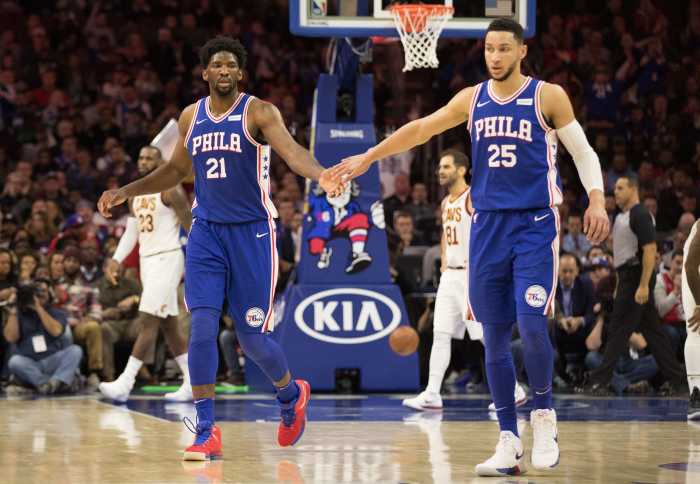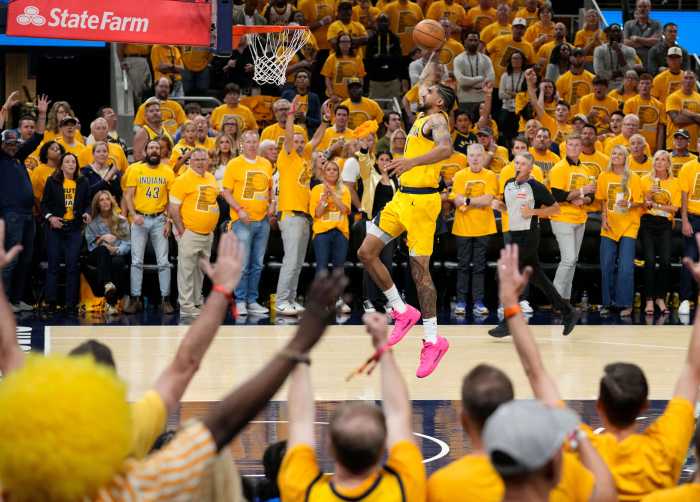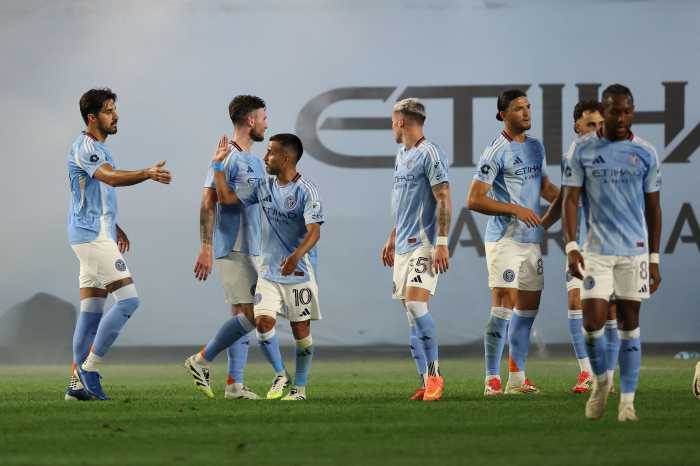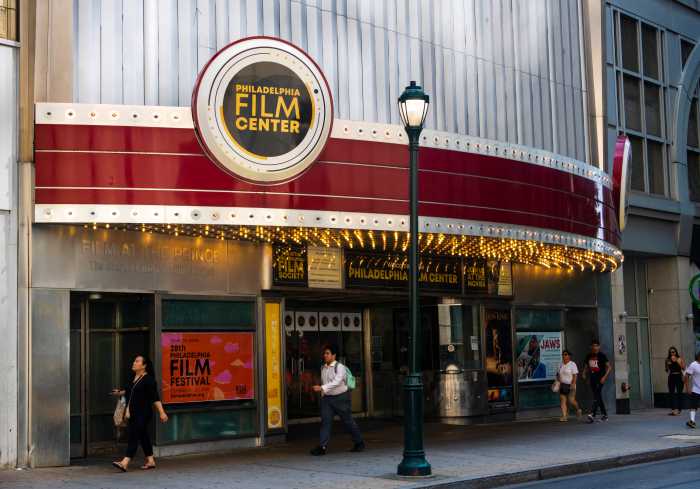After the Philadelphia 76ers‘ frustrating loss in Game 4 of the first round of the NBA playoffs, Joel Embiid addressed the media and was asked about the many fans in attendance who supported the opposition.
Since his response made its way to the public, much has been made, and the fanbase has, in many cases, been split, either brushing the comments off as nothing or the louder response of firing back at Embiid.
Before breaking down Embiid’s comments, let’s start with why Embiid spoke of the fans in the first place.
What is an interview?
Forgive the snark, or don’t, but when a player is asked a question, the typical expected response is for them to answer said question. No one would be happy if Embiid had refused to answer, and if he had pretended the Knicks crowd wasn’t noticeable, he would have been labeled delusional.
It was a fair question, and Embiid gave a fair answer that has either been escalated by a fanbase rightfully hurt by the organization, not its star player in this case.
Did Embiid actually blame the fans?
No, of course not; that would be ridiculous and troublesome.
While many have questioned Embiid’s willingness to take ownership in the face of adversity, being right in doing so on multiple occasions, this was not an example of Joel deflecting. In the defense of many fans, if you truly call it a defense, some had only seen a quick blurb of what Embiid said as other fans, and frustrating to say, media members shared selective portions in hopes of garnering engagement.
Others remain divided on the issue, siding with Embiid in the simple fact that there were too many Knicks fans in attendance on Sunday.
Before diving into the meaning behind the words, it’s important to go over the full and complete quote by Embiid, courtesy of SNYtv’s Ian Begley:
“Disappointing. I love our fans. Think it’s unfortunate and I’m not calling them out, but it is disappointing. Obviously, you got a lot of Knicks fans and they’re down the road and I’ve never seen it, and I’ve been here for 10 years. Yeah, it kind of pisses me off, especially because Philly is considered a sports town. They’ve always shown up and I don’t think that should happen. Yeah. It’s not okay.”
In a vacuum, nothing Embiid said is wrong. It is unfortunate that the Sixers fans were outdone by the Knicks fans. This is the first time in many years that the stadium has been taken over in such a way. Embiid is also right to be angry, as should fans. New York is the enemy in this series, and watching videos of Knicks fans incessantly cheering or celebrating in the concourse or outside the stadium should anger fans.
Embiid is also right to call Philadelphia a sports town and to acknowledge the support the fans have shown historically, particularly over his years with the team, as he mentioned. He’s not mad at the fans; he’s mad at the situation.
Where Embiid is misguided is that he implies it was entirely up to the fans to secure the home-court advantage for Philadelphia, when in reality, things are far from so simple.
Are the fans really to blame?
Once again, the answer is an obvious no. Philadelphia fans are not the primary, secondary, or tertiary reason the Sixers lost Game 3.
Tyrese Maxey’s inability to establish an offensive rhythm, the team’s inability to prevent the Knicks from feasting on the offensive boards, and the team’s horrendous finish to the game, which saw them go without a field goal over the final five-plus minutes, are certainly more damning factors.
There is something to be said about those who callously sold their season tickets and those who were perfectly able to attend but didn’t care to, however, as much as it is the fan’s responsibility to support the team, it’s the organization’s responsibility to spark fans’ desire and ensure that the home crowd is truly that. This was the greatest failure that allowed Knicks fans to take over the Center.
Who’s really to blame for the invasion of Knick fans?
Two of the biggest factors leading to the lack of home crowd support were entirely in the control of the Sixers’ organization. The first of which is that tickets to the game were simply not realistically attainable for many of Philadelphia’s faithful.
The most affordable ticket option for Game 6 is a verified resale through the team’s ticketing partner, Ticketmaster, listed at $155. A standard ticket is $10 more at $165 per ticket. Both of these tickets are for the team’s “Affordable” “New City Terrace,” a standing-room section on the stadium’s top level.
Now imagine trying to purchase tickets for three, the average family size in Philadelphia. That is much more feasible for a city like New York, where the median household income is one and a third times that of Philadelphia.
The Philadelphia Phillies found a way to secure home-field advantage through selective ticket sales. The Sixers, however, did not follow suit. Instead, the organization collected the funds and proceeded to look around the building like a hotdog who just crashed his car into a storefront trying to find the party responsible.
This is a business. Sure, but running a successful business is as much about client retention as it is about maximizing short-term profits. Generating that level of hometown support not only secures seating and concession sales but also merchandise profits both in the stadium and through licensed dealers. Building and maintaining that organization/fan relationship is not just an ideal situation for the fans; it’s also good business, as is putting a successful product on the court.
Now comes the second factor: the team’s litany of dramatic failures over the past 20-odd years.
The end of the Iverson era brought years of mediocre basketball headlined by an overtaxed Andre Iguodala and a grinding tenure by head coach Doug Collins. That eventually came to an explosive end after the failed Andrew Bynum trade set the path to the Process.
Less than three years in was the fall of the mind behind the Process, Sam Hinkie, which begot the rise of the Colangelos, which saw its own explosive end, which led to an already overburdened head coach thrust into a joint front office role.
Under all of those parties, the Sixers experienced an impressive amount of failures in the draft, the crucial element of the Process. Selecting players better suited for eras of basketball gone by, players who were either unwilling or unable to shoot, and trading away the prospect who was undoubtedly the best fit alongside the one selection they got right over the first five years of the Process.
That’s not even to mention the wasting away of whatever trade value Ben Simmons had before his demand, letting Jimmy Butler walk away for practically nothing, and undermining the team’s superstar center at every opportunity.
Then there are the many postseason failures. Sure, the Kawhi-shot season can be relatively forgiven, but the team’s losses to the Atlanta Hawks and the Boston Celtics last season were soul-crushing for fans due to the collapse the team saw in both years. That’s roughly 10 percent of what Sixers fans have dealt with in the past 20 years. The incentive to believe is simply not there.
This is not to say fans should boycott the team until a championship is won. Fans should support the team, and they have for many years. In fact, they should be rewarded for that faithful support, not set up to be the fall person when the team fails to secure the home court.
Perhaps it would be in everyone’s best interest if the organization focused on the team’s current situation instead of pushing a stadium the city constantly fights or even unrelated ventures.
Avoiding a repeat of this situation is crucial. If there even is another game in Philadelphia that is.






















